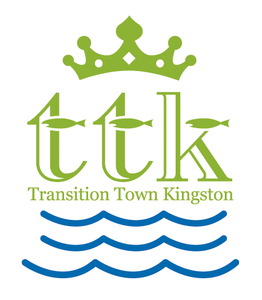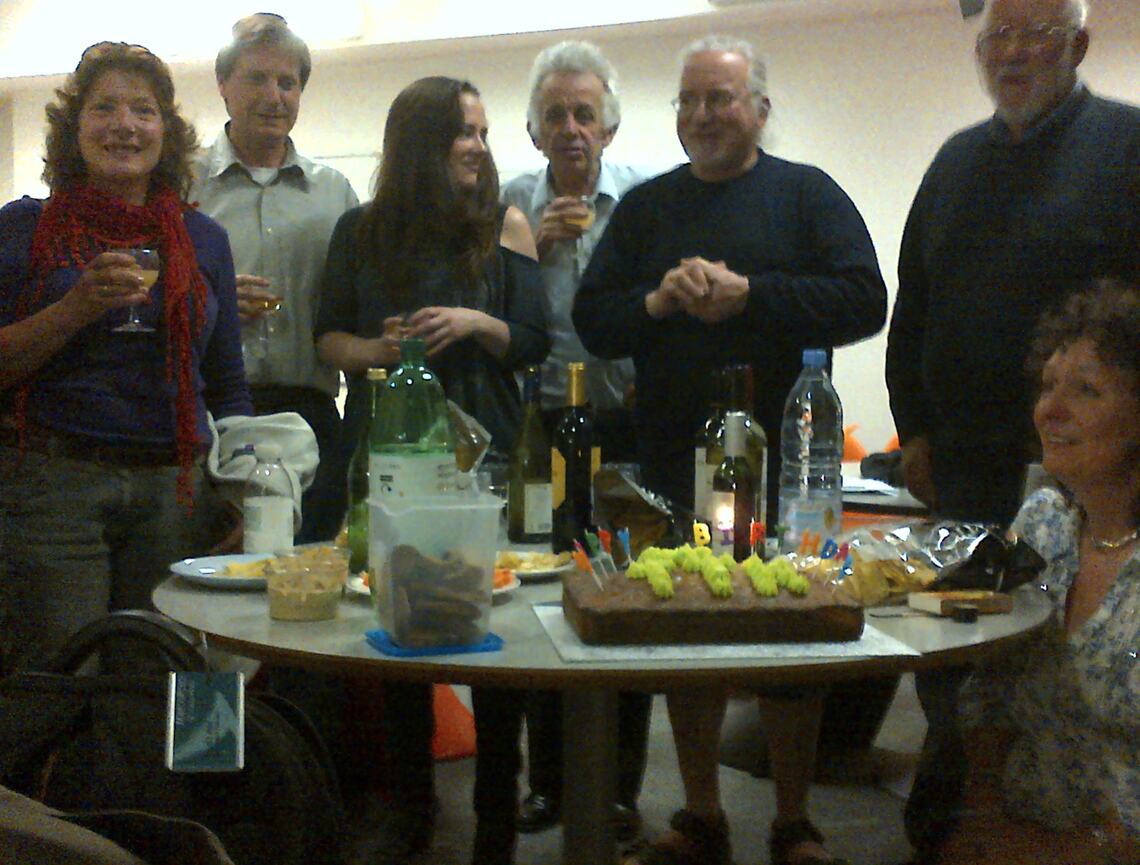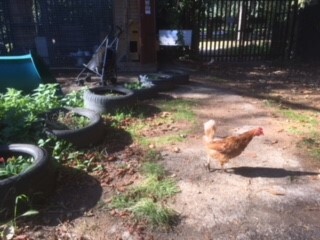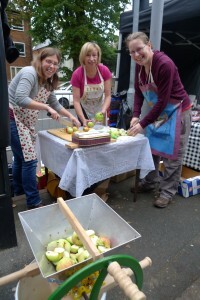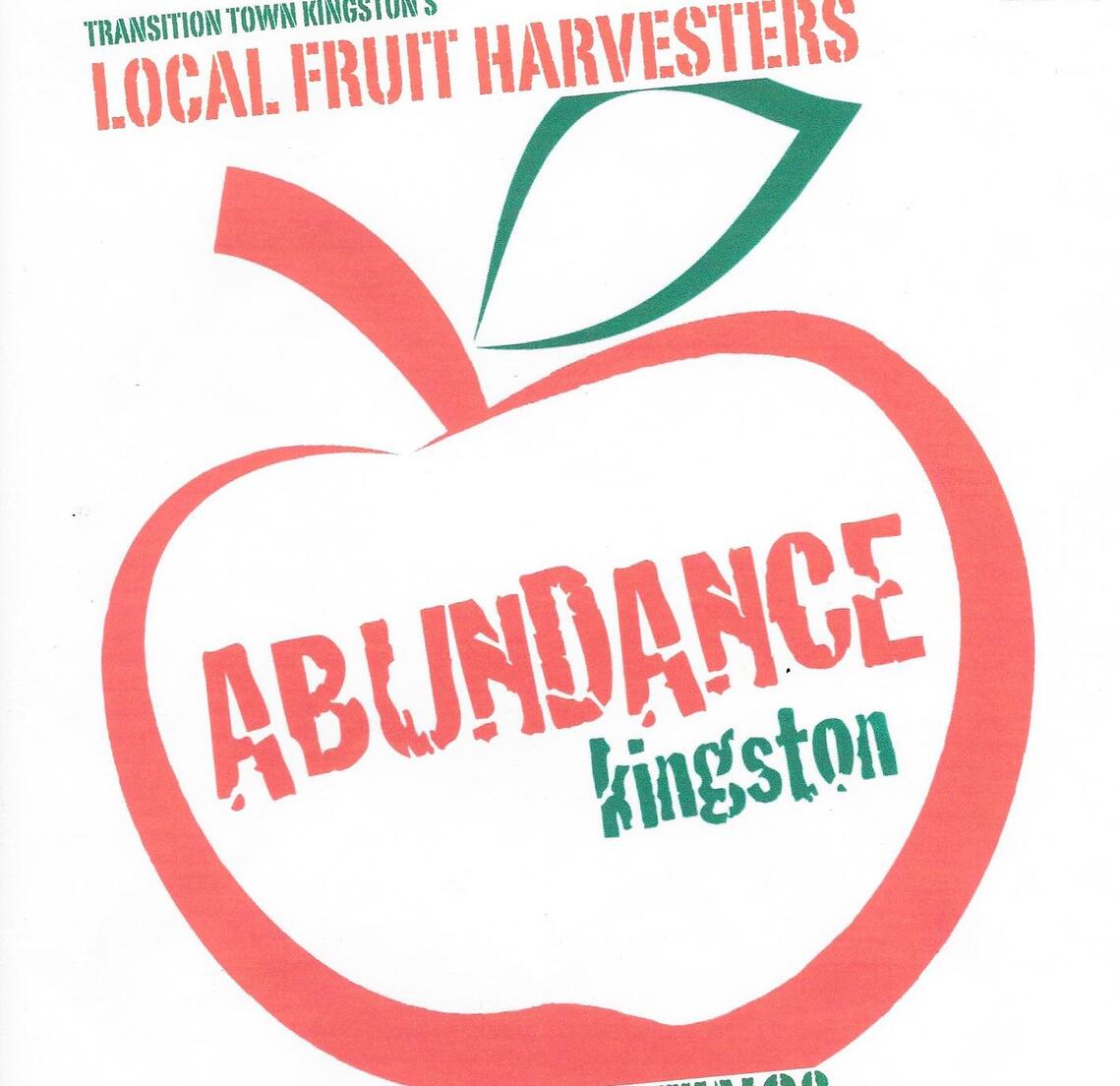Transition to more sustainable, more local, food
“It is only in the past 50 years that we have perfected the art of the completely useless and unproductive urban landscape, at the same time as we have become nearly completely dependent on long, and highly oil-dependent, supply chains. Yet within this vulnerability is a huge opportunity for rethinking how we feed ourselves. Food is often where Transition initiatives start, and it offers a great way of finding common ground, given that everyone interacts with food on a daily basis! There are many food projects a Transition initiative can start, from garden shares to community supported farms…” (From Transition Network on food initiatives)
"In the future, why would we plant ornamental, unproductive trees, when we could plant fruit or nut trees? Let’s reimagine our towns and cities as food forests." (From The Essential Guide to Doing Transition)
Cheap food has hidden costs, social and environmental. These include soil erosion and destruction of rural communities through intensive farming, mass deforestation and biodiversity loss, fisheries depletion, water pollution and food chain contamination by agrochemicals, and production of greenhouse gases especially by the meat and dairy industry. Cheap food also encourages us to waste food!
TTK initiatives on food
Sharing food and drink is a regular and important aspect of TTK AGMs and birthdays as well as other occasions and gatherings. There are also a range of food- growing and harvesting groups and projects active across the borough helping Kingston to transition. Some were established long before TTK, others are newly formed with TTK support – and all are helping create a more sustainable future for Kingston.
See also our Growing Tips for nature-friendly gardening.
Canbury Community Garden
Since 2016 volunteers have been transforming the neglected former gardeners’ yard on the edge of Canbury Gardens into a productive wild-life-friendly community garden. If you’d like to learn more about wild-life-friendly gardening, or you are a keen gardener with skills you could share, or you’d enjoy working with other people to grow herbs and other edibles, come along to one of our events or weekly work sessions. The basic principle is that those that do wht work get the harvest - and we have had some excellent harvests of runner and broad beans, tomatoes, courgettes, spinach...
Since September 2018 the community garden has also been home to Canbury Community Chicken Collective, whose 7 members share the work and expenses of keeping a few rescued chickens, in return for eggs and hours of chicken entertainment.
CCG thanks the many volunteers and donors that have made our community garden possible, including small grants at just the right times from CARA/Berkeley Homes, Transition Town Kingston, Kingston Environment Centre, Kingston Rotary. and the Royal Borough of Kingston. Early in its existence the community garden was adopted by TTK, which provides us with a bank account, insurance cover and lots of useful advice. Get involved! Find out more, including times of our weekend gardening sessions on our Facebook page. Or find a community garden near you.
See a May 2020 report on a Sustain webinar on community gardening during Covid-19
Abundance Kingston
Each year tons of fruit go unpicked, often because the fruit is too high up or there is too much on the tree. Abundance Kingston aims to save food waste by harvesting seasonal gluts of local fruit, such as apples, pears and plums, and redistributing this surplus within the local community (nurseries, homeless shelters, individuals, etc.) all on a not-for-profit basis. Tree-owners always get the first share of the harvest, with some fruit being left for the birds, bees and insects. Bruised and damaged fruit is juiced whenever possible to save further waste.
Abundance Kingston aims to educate all ages about the value of local fruit trees for a huge variety of reasons including: providing delicious fresh fruit and juice - which is organically grown, very nutritious and chemical free; reducing our carbon footprint - as it does not needed cold storage or refridgerated transport across land and sea, generally involved in long distance transportation of food. It also reconnects people to the land, appreciating where food comes from and what it can be made into, and nurtures understanding of the importance of local food security and living a more sustainable lifestyle.
All fresh fruit is given out for free, and the project is self-sustaining by making and selling apple juice at local community events. We have 2 fruit-presses for juicing fruit, and we encourage all ages to join in with juice-making. The presses are also loaned out to allotments, schools etcwanting to make their own juice. Workshops in preserving the produce can also be arranged on request. Future dreams include making local cider and wine from the fruit and saving vegetable waste too.
We need volunteers, particularly in September, to help harvest - it’s wonderful to be out there picking fruit in a leafy garden on a sunny morning and very sociable. We also need people to coordinate volunteers, field requests, arrange picking sessions and help with the distribution. Get involved! Email Abundance Kingston if you’d like to know more or volunteer. Read Abundance occasional updates and reports.
Other local food initiatives
Harvest Time, a poem and song by Tariq Shabbeer
Hogsmill Community Garden - see their Facebook page
Kingston Environment Centre Community Garden, 1 Kingston Road, New Malden. KT3 3PE. KEC also run regular seedswaps, undertake community gardening around New Malden, and have a tool library
Kingston Edible Forest Garden, Knollmead Allotments, Tolworth - group permaculture gardening, duck pond, poly-tunnel and tea over the fire in a wonderful oasis.
Parkfields Community Garden - see their Facebook page
+
Love Food Hate Waste - aims to raise awareness of the need to reduce food waste and help us take action.
Past TTK projects and events on food
“Should we all be vegan?” – a Veganuary panel brought together by TTK and hosted by All Saints Kingston on 23rd January 2020 , discussed a range of facts and viewpoints on sustainable and ethical eating. Read more here. The panel was brought together for another discussion, this time on-line, in Kingston Libraries Eco-Festival in August 2020 - you can watch the discussion here.
How not to waste food - some advice and weblinks
Kingston Kitchen was co-ordinated by local foodie and TTK co-founder Toni Izard, to encourage and enable everyone to
produce delicious, flavoursome, chemical free foods using seasonal and, where possible locally grown produce. There were opportunities for small groups to learn and try out a wide variety of food preparation skills, giving them the confidence to cook healthy, home made grub for family and friends or to give away as gifts! From quarterly cookery demonstrations to opportunities in late summer and early autumn to make jams, marmalades, pickles and chutneys, there was something for everyone! Towards the end of the year, there were sessions on Christmas Fayre such as mincemeat, puddings and cake. Sessions were informal, social and easy to follow, attempting to demystify cooking whilst also having some fun!
From the Ground Up: unfortunately, TTK’s award-winning weekly organic veg and fruit food scheme which started in 2010 had to close in March 2016.
Broad Oaks, Tolworth, was a one-year TTK project, funded by the local Neighbourhood Committee and aimed at encouraging local residents and businesses to clear up Broad Oaks and do some herb and other planting in a community garden established behind the former Blockbusters by volunteers from TTK and local residents. At the end of the funding period, the project was handed over to the local community.
March 2016, “Whose food is it anyway?” at Kingston Quaker Centre, hosted by Transition Town Kingston and Global Justice Now: this special event explored the corporate takeover of the global food system and the alternatives. Speakers Aisha Dodwell (Global Justice Now) and Andy Goldring (Permaculture Association) discussed different aspects of an alternative, agro-ecological vision for the food system – one that puts people before profits, and serves the common good.
August 2015, TTK at Kingston Food Festival talked to passers-by about TTK project Abundance, Love Food Hate Waste, and TTK veg box scheme From the Ground Up sharing a table with Kingston Beekeepers who, as always, proved a big draw. Hilary showed off some Abundance kit, Fiona offered samples and recipes from FGU, and Marilyn gave people tips about saving money by throwing away less food – the most needed tips seemed to be that you can probably freeze many more foods than you thought you could, and that bargains aren’t bargains if you can’t eat them before they start to perish - more about use by dates here.
April 2014,“Local Food Roots”: at TTK AGM & 6th birthday party, we launchedf our "Growing Together" project with this film.
July 2013, No 11 Supper Club gourmet vegetarian meal at Tamesis Sailing Club: a vegetarian feast by the riverside, with organic ingredients sourced within 10 miles of Kingston, prepared by by ex-chefs from Michelin- starred Petersham and The River Cafe. Congratulations to No. 11 Supper Club who created it, Hounslow Farm and others who grew it, From the Ground Up who initiated and convened it, Tamesis Club who hosted it, and those of us who turned up and relished eating it.
June 2013, Urbanfarmacy Working Party: TTK folk helped local YMCA group start to transform part of an overgrown suburban garden into an abundant permaculture space by pulling out pernicious weeds and planting squashes, calendula and beans on a gloriously sunny afternoon in Surbiton.
February 2013, TTK open meeting – on “Guerrillallotments”: Transitioners who’d like to see fruit, vegetables and bee-friendly plants growing in Kingston’s neglected public spaces (verges, roundabouts, planters, odd corners of parks…) and unusual private spaces (front gardens, balconies, rooftops, windowboxes…). gathered at C-SCAIPE to plot their plots. We discussed where (central Kingston was considered a particularly good spot for publicity and compactness) and how to coordinate our activities and get permission so that we didn’t dig up each other’s seeds or disrupt areas already set aside for nature conservation. Free wild flower seed-balls and guidance on growing and companion planting from the River of Flowers were given away, and possible participation in the Chelsea Fringe festival and obtaining funding and free plants were also discussed. One outcome of the meeting was a new project Urbanfarmacy, set up by Fiona Quinn, owner of Saffron Organic, with the aim of helping the local community to grow seasonal fresh food, and herbs which to eat or use to make skin care products. Urbanfarmacy would help Kingston’s “urban farmers” to find unused growing spaces around the borough to cultivate with food and other useful plants, along with the wild flowers that play such a vital role in supporting pollinators. Urbanfarmacy also had plans for a special Chelsea Fringe project.
March 2011, Learn a skill: making a raised vegetable bed in North Kingston offered a chance to learn how to build a raised bed from recycled materials and have a go at all the skills. All materials, tools, knowledge and refreshments were provided and there was a picnic lunch afterwards.
November 2010, Eat and Meet with the From The Ground Up Food Cooperative at Steph’s house, New Malden. From The Ground Up was growing so this was an opportunity to have a voice in its development and what it could offer the Kingston community, policy, funding, marketing, products, volunteering, technology, community activities (e.g. schools) and anything else people wanted to talk about. And all with great food!
July 2010, Transition Town Kingston Big Lunch Family Picnic welcomed all members of TTK, their families and friends, to a celebration picnic BBQ as our contribution to The Big Lunch, a national day of street parties. We joined with other groups including Permaculture and KUTLETS at Kingston’s forest garden, established 19 years ago as a fun, sociable and easy way of producing local food.
March 2010, TTK Food Group launched their ‘From the Ground Up’ organic veg box scheme with trial involving 8 families
September 2009 TTK Food Group was launched with a survey of members’ priorities on food.
